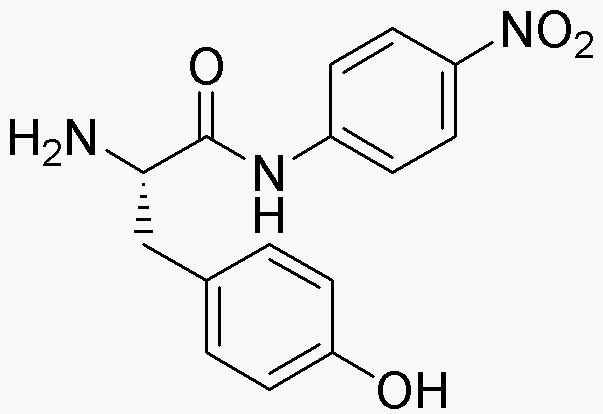L-Tyrosine 4-nitroanilide is widely utilized in research focused on:
- Biochemical Assays: This compound serves as a substrate in enzyme assays, particularly for studying the activity of tyrosinase, which is crucial in melanin production and various biochemical pathways.
- Colorimetric Detection: It is used in colorimetric assays to detect the presence of specific enzymes, providing a visual indication that is easy to interpret, making it valuable in laboratories.
- Pharmaceutical Research: The compound plays a role in drug development, particularly in the synthesis of new pharmaceuticals targeting neurological disorders, due to its structural similarity to neurotransmitters.
- Material Science: L-Tyrosine 4-nitroanilide is explored in the development of polymer materials that require specific thermal and mechanical properties, enhancing product performance.
- Food Industry: It is applied in food technology for monitoring enzymatic reactions, ensuring quality control in food products that involve tyrosinase activity, such as in the browning of fruits.
General Information
Properties
Safety and Regulations
Applications
L-Tyrosine 4-nitroanilide is widely utilized in research focused on:
- Biochemical Assays: This compound serves as a substrate in enzyme assays, particularly for studying the activity of tyrosinase, which is crucial in melanin production and various biochemical pathways.
- Colorimetric Detection: It is used in colorimetric assays to detect the presence of specific enzymes, providing a visual indication that is easy to interpret, making it valuable in laboratories.
- Pharmaceutical Research: The compound plays a role in drug development, particularly in the synthesis of new pharmaceuticals targeting neurological disorders, due to its structural similarity to neurotransmitters.
- Material Science: L-Tyrosine 4-nitroanilide is explored in the development of polymer materials that require specific thermal and mechanical properties, enhancing product performance.
- Food Industry: It is applied in food technology for monitoring enzymatic reactions, ensuring quality control in food products that involve tyrosinase activity, such as in the browning of fruits.
Documents
Safety Data Sheets (SDS)
The SDS provides comprehensive safety information on handling, storage, and disposal of the product.
Product Specification (PS)
The PS provides a comprehensive breakdown of the product’s properties, including chemical composition, physical state, purity, and storage requirements. It also details acceptable quality ranges and the product's intended applications.
Certificates of Analysis (COA)
Search for Certificates of Analysis (COA) by entering the products Lot Number. Lot and Batch Numbers can be found on a product’s label following the words ‘Lot’ or ‘Batch’.
Numéro de catalogue
Numéro de lot/série
Certificates Of Origin (COO)
This COO confirms the country where the product was manufactured, and also details the materials and components used in it and whether it is derived from natural, synthetic, or other specific sources. This certificate may be required for customs, trade, and regulatory compliance.
Numéro de catalogue
Numéro de lot/série
Safety Data Sheets (SDS)
The SDS provides comprehensive safety information on handling, storage, and disposal of the product.
DownloadProduct Specification (PS)
The PS provides a comprehensive breakdown of the product’s properties, including chemical composition, physical state, purity, and storage requirements. It also details acceptable quality ranges and the product's intended applications.
DownloadCertificates of Analysis (COA)
Search for Certificates of Analysis (COA) by entering the products Lot Number. Lot and Batch Numbers can be found on a product’s label following the words ‘Lot’ or ‘Batch’.
Numéro de catalogue
Numéro de lot/série
Certificates Of Origin (COO)
This COO confirms the country where the product was manufactured, and also details the materials and components used in it and whether it is derived from natural, synthetic, or other specific sources. This certificate may be required for customs, trade, and regulatory compliance.


